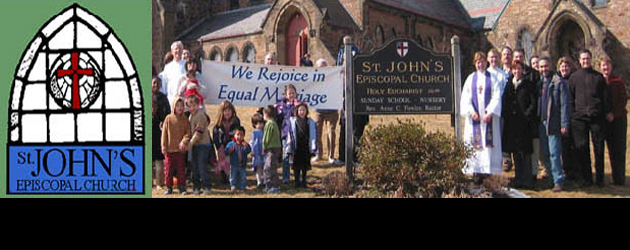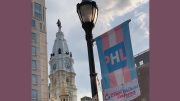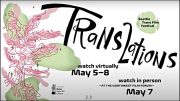State Representative Byron elected vice president of church legislative body
By: Chuck Colbert /TRT Reporter–
It’s a new day for the Episcopal Church, as clergy and leaders prepare to welcome an official blessing for same-sex couples and affirm full participation by transgender people.
Meeting in its triennial gathering last week in Indianapolis, the Episcopal Church approved an official blessing for same-sex couples and at the same time delegates at the 77th General Convention (July 5-12) approved another LGBT-positive resolution, one that affirms full transgender participation, including a non-discrimination policy, which allows for the ordination of transgender clergy in the priesthood.
The vote on gay blessings came July 10 and was lopsidedly in favor, with the House of Deputies, which includes the laity and clergy, giving its approval by a 171-50 margin, according to the New York Times .
The vote in the House of Bishops, a day earlier, was equally decisive, with delegates favoring the new rite by 111-41, including three abstentions, according to Episcopal News Service.
Clergy can decline a blessing
While falling short of using the word “marriage” to describe the new rite – called “The Witnessing and Blessing of a Lifelong Covenant” – its liturgical celebration is similar.
For example, the couples consent to a lifelong commitment, exchange vows and rings, and receive a blessing.
Starting on the first Sunday of Advent, December 2, clergy members will need permission of their bishops to bless gay couples.
But clergy can decline to preside at a blessing liturgy as the resolution also states that no one “should be coerced or penalized in any manner, nor suffer any canonical disabilities” for either supporting or objecting to the convention’s approval of a blessing rite for same-sex couples.
In a telephone interview, the Reverend Jay E. Johnson, an ordained Episcopal priest, discussed the significance of his church’s more fully embracing LGBT persons among the faithful.
“For some observers” these recent actions at General Convention “might seem like this is coming out of the blue,” he said. “But the Episcopal Church has been working on LGBT issues for a relatively long time.”
Johnson, who is gay, wears several hats at the Berkeley-based Pacific School of Religion where he is a lecturer in theology and culture and senior director at the Center for Lesbian and Gay Studies in Religion and Ministry for Academic Research and Resources.
Back in 1976, Johnson explained, General Convention “using the language of the day, passed a resolution which said homosexuals, like all other persons, have full and equal claim on the love, acceptance, and pastoral care of the church.”
Of course, over time, the question became how to put that into practice, said Johnson, who readily acknowledged, “a lot of two steps forward and one step back, along the way.”
A significant Episcopal milestone was reached in 2003, moreover, with the consecration of its first openly gay bishop, Gene Robinson of New Hampshire.
Two years ago, Mary Glasspoll became the second openly gay Episcopal bishop in the Los Angeles Diocese.
National church approval is key this time around, not just provisional
Johnson also said that while other blessing liturgies have been done in various parts of the church for some time, the recent resolution is important “because the national church is giving approval for a rite to be used throughout the whole church for this purpose.”
“It’s no longer an ad hoc” experiment “to see if we can get away with it,” he said, referring to blessing liturgy.
Rather, “It’s a firm, clear, and formal acknowledgement and recognition same-gender couples in our congregations,” said Johnson.
Three years ago, General Convention gave provisional permission to clergy to bless gay couples, but only with their bishops’ approval.
Study of “Christian marriage” is key part of resolution
Another significant feature of the 2012 resolution, said Johnson “is its call to form a three-year task force to study further the meaning of Christian marriage.”
Johnson served as chair of the Theological Resources Task Force for the resolution.
“For those of us who worked on this for the past two-and-a-half years we realized a real need for educational materials and conversations and ways to engage people on the theological meaning of marriage,” he said.
“Even though this was not a wedding liturgy that was approved and even though marriage was not used to describe it, it’s very clearly calling for study on what is Christian marriage anyway,” Johnson explained. “So I am really excited about those conversations moving forward.”
The materials approved as part of the blessing resolution are nearly 100 pages, which include a series of theological essays, educational materials for congregations, pastoral care materials for couples and congregations, and the liturgical rites.
Jamaica Plain reverend on the blessing
Closer to home, the Reverend Anne C. Fowler, rector of Jamaica Plain’s St. John’s Episcopal Church, welcomed the blessing rite.
“It’s an acknowledgement of what is happening in the larger culture and long over due,” she said over the telephone. “It’s unfortunate [blessing liturgy] is not a marriage rite.”
For a time during the state’s same-sex marriage battle, Fowler served as board president for the Religious Coalition for the Freedom to Marry, a local interfaith advocacy organization, on the forefront of marshaling religious activism for marriage equality.
Fowler has been marrying people since 2004, using the Episcopal Church’s Book of Common Prayer, she said, “unless people want something different.”
With the vote in Indianapolis, the Episcopal Diocese of Western Massachusetts will allow clergy to bless gay couples starting in December, but will not permit clergy to marry them, which its Eastern Massachusetts sister diocese has sanctioned since 2009
Big win for transgender inclusion
Meanwhile, transgender Episcopalians are equally excited and celebratory with the approval of a resolution called “Extending the Rights of the Laity,” which bans discrimination on the basis of “gender identity” and “gender expression.”
Massachusetts State Representative Byron Rushing (D-South End) proposed the resolution.
Another resolution, titled “Affirming Access to Discernment Process for Ministry” makes explicit that ordination is open to transgender persons and that they have “equal place in the life, worship, and governance of the church.” Rushing endorsed the resolution.
A vocal and visible advocate of equal-marriage and transgender rights in the state Legislature, Rushing, a layperson, was also elected to serve as vice president of the church’s House of Deputies.
Boston University Reverend on Transgender inclusion
The Reverend Cameron Partridge, who serves in the Episcopal chaplaincy at Boston University, offered his thoughts in e-mail correspondence.
“As someone who was ordained as an openly transgender man in 2004-5, it was especially affirming to see the convention take this bold step, proclaiming that there be no bar to trans people discerning a lay or ordained ministry in the Episcopal Church,” he said.
As in 2009, Partridge attended General Convention with TransEpiscopal, a group of transgender and allied Episcopalians who, he said, “came to share stories and make ourselves available for conversations, particularly with those unfamiliar with the trans community.”
“We were so moved by the conversations we were able to have. With the strong support of partner organizations IntegrityUSA, the Consultation, and the Chicago Consultation, we were able to connect with a wide range of people. Both the Houses of Bishops and Deputies passed our resolutions by a wide margin – the ordained ministry resolution passed by 85 percent in the Deputies (the only vote for which we have exact numbers),” said Partridge.
“Though people of all ages and all regions of the country supported the trans resolutions, young adults offered particularly moving testimony, and that was especially gratifying to me, as someone who works with young adults at Boston University and Harvard Divinity School,” he added.
“Ultimately, to my mind, the General Convention votes were about recognizing our connection to one another, seeing one another’s humanity, even when we do not fully comprehend one another’s experience. And for that reason, I hope that the conversations will continue, particularly with those who did not agree with the votes or may even feel alienated by them. At the end of the day, we are all part of one another. We all contribute indispensably to the wider whole,” Partridge said.
Episcopal Church affirms “… human dignity …”
For its part, the Chicago Consultation issued a statement on transgender inclusion.
“During our long journey toward the full inclusion of lesbian and gay Christians in the life of the church, Episcopalians have slowly come to accept that God made us in more varieties than typical ‘masculine’ men and ‘feminine’ women and have begun to respond to this insight by dealing more justly with previously marginalized and stigmatized transgender people,” said the Reverend Lowell Grisham, a co-convener of the group.
He added, “Today the Episcopal Church affirmed the human dignity of a deeply stigmatized population that is far too often victim to discrimination, bullying and abuse. We will no longer turn a blind eye to the violence and rejection suffered by transgender people. Now our clergy and lay leaders can represent the breadth of our church and serve as agents of welcome to all of God’s people.”
The Chicago Consultation is a group of Episcopal and Anglican bishops, clergy and lay people, in support of the full inclusion of LGBT Christians in the Episcopal Church and the worldwide Anglican Communion.
The Episcopal Church, with 1.9 million members, is the U.S. branch of Anglicanism, which has roots in the English Reformation.
© Copyright. Chuck Colbert. All rights reserved.








